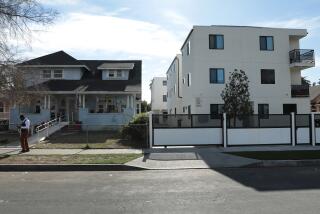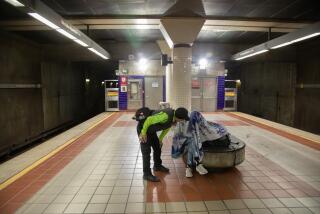Opinion: Metro CEO says transit agencies need to care about gentrification
Los Angeles County Metropolitan Transportation Authority CEO Phil Washington wants his agency to do more to prepare for gentrification around new transit lines and help prevent the displacement of longtime residents.
Washington, who has been on the job for seven months, said too many transportation officials believe their sole responsibility is the transit line and that they have no interest in the development that occurs around the stations. The result is that low-income residents and businesses are often displaced shortly after new transit lines open.
“I should care about gentrification,” Washington told the Los Angeles Current Affairs Forum on Friday. “I should care about displacement of what, most of the time, ends up being communities of color.”
“It impacts my bottom line,” he said, adding that those displaced residents are often low-income and regular transit users. If they move away from the urban centers, Metro loses riders or has to extend service to reach them.
Metro is under increasing pressure from community groups and affordable housing advocates to address concerns about gentrification. Highland Park, along the Gold Line, has been called ground zero for gentrification in L.A., as apartments switch to condos and older rental homes get bought up for makeovers. Boyle Heights residents effectively shut down a shopping center that was proposed for Metro-owned land at Mariachi Plaza. And in Leimert Park, some businesses fear they are going to pushed out by higher rents and development along the new Crenshaw Line.
In the past, Metro has played a more passive role in the development around stations and gentrification wasn’t something the agency’s leaders talked about much. That began to change a few years ago when Metro began offering grants to cities to help them plan for development around transit stations. Metro’s board of directors stepped it up in March, voting to set a goal that 35% of all apartments and condos built on land no longer needed by Metro be set aside for low-income residents.
The Times Editorial Board supported the board’s decision, saying at the time:
“There is a real concern that ridership will decline if the housing prices around transit stations skyrocket. Why? Because wealthier residents usually own cars and tend to use transit less than other residents. Workers who earn less than $25,000 and live within half a mile of a transit station are three times more likely to take transit than those who earn more than $75,000 and live close to a station. Metro has an interest in ensuring that the people who ride public transportation can afford to live near it.”
Washington said Friday that the agency would go even further with its Transit-Oriented Community Demonstration Program, in which Metro will work with cities to study development patterns and opportunities within two miles of stations. Staff will present 10 to 12 sites that could become pilot projects at the Metro board’s Oct. 22 meeting.
But many community advocates want Metro to do even more. During a Planning and Conservation League symposium on sustainable cities at UCLA on Saturday, attendees pressed Calvin Hollis, who oversees Metro’s real estate and development operation, on what more the agency could do to prevent displacement along transit lines. Could, for example, Metro require that cities build or zone for affordable housing if they receive transit funding? Hollis said Metro is focused on giving local officials tools and incentives -- not mandates -- to help deal with gentrification.
The problem is timing. Cities, including Los Angeles, are moving slowly to plan for and zone land around developing stations, and they are even slower to adopt citywide policies that preserve and create more affordable housing. Meanwhile, Metro’s construction crews are moving full steam ahead. The Gold Line and Expo Line extensions will open in early 2016. And real estate speculators are already buying up land along the Purple Line extension.
Metro should care about gentrification, as Washington said. The question is whether the agency can do something about it before it’s too late.
For more opinions, follow me @kerrycavan
More to Read
A cure for the common opinion
Get thought-provoking perspectives with our weekly newsletter.
You may occasionally receive promotional content from the Los Angeles Times.







